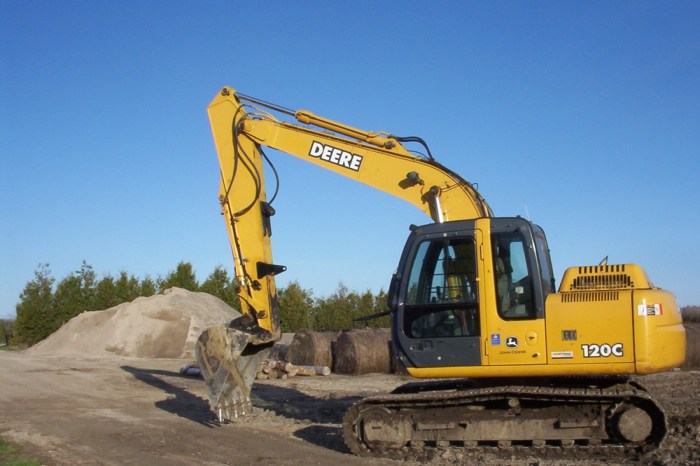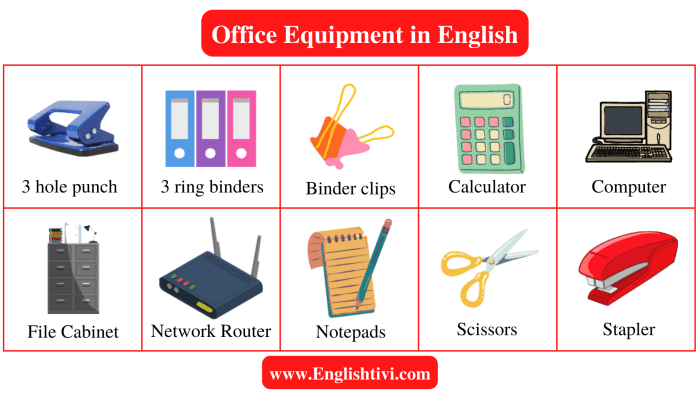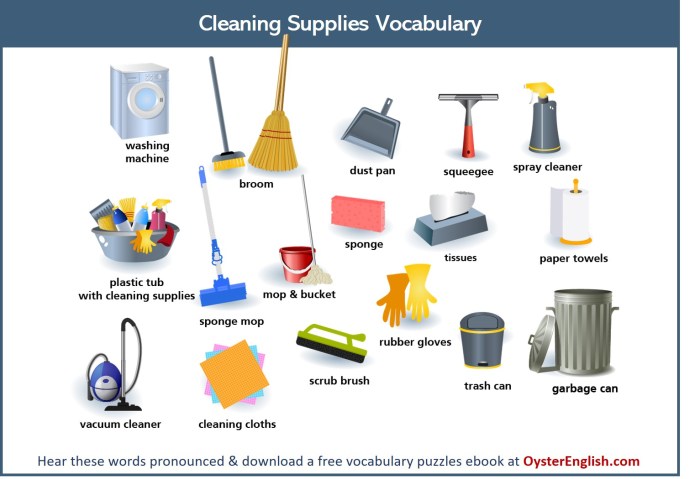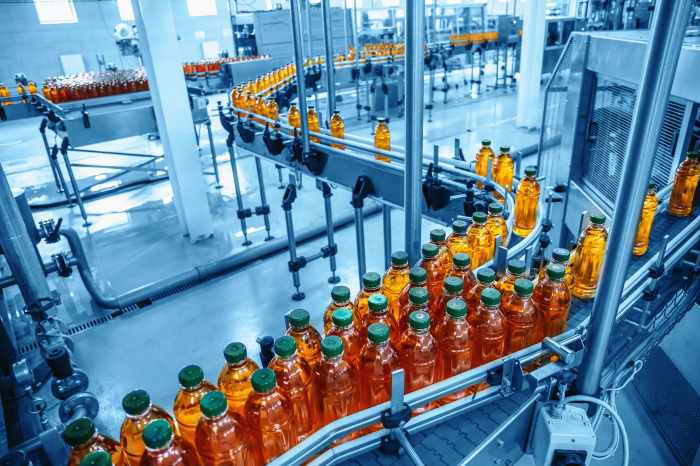Equipment and supplies used by businesses in their operation are indispensable components that play a pivotal role in shaping the success and efficiency of any enterprise. This comprehensive analysis delves into the diverse range of equipment and supplies utilized across various industries, exploring their significance and the impact of technological advancements on their evolution.
From the ubiquitous office equipment that facilitates daily tasks to the specialized machinery employed in industrial settings, the equipment and supplies used by businesses encompass a vast array of items. This discourse examines the importance of these resources, the safety measures associated with their use, and the transformative effects of automation and technological progress on their functionality.
Office Equipment and Supplies: Equipment And Supplies Used By Businesses In Their Operation

Offices rely on various equipment and supplies to facilitate their daily operations. Essential equipment includes computers, printers, copiers, and scanners. These devices enable communication, document creation, and information storage.
Office supplies play an equally crucial role. Paper, pens, ink, and other consumables support administrative tasks, note-taking, and record-keeping. Technology has significantly impacted the types of equipment and supplies used in offices. Computers and digital storage have reduced the reliance on paper documents, while cloud-based software has replaced many traditional office tools.
Office Equipment
- Computers: Used for processing data, communication, and software applications.
- Printers: Produce physical copies of digital documents and images.
- Copiers: Create multiple copies of documents, often with additional features like scanning and faxing.
- Scanners: Convert physical documents into digital formats for storage and sharing.
Office Supplies
- Paper: Used for printing, writing, and copying documents.
- Pens: Essential for writing, note-taking, and signing documents.
- Ink: Consumable used in printers and pens to create text and images.
- Staplers and paper clips: Secure and organize documents.
Industrial Equipment and Supplies
Industrial settings require specialized equipment and supplies to perform complex tasks and ensure safety. Heavy machinery, such as cranes, excavators, and forklifts, are essential for construction, manufacturing, and transportation.
Tools like drills, saws, and wrenches are also vital for assembly, repair, and maintenance. Safety measures and regulations are paramount in industrial environments, including protective clothing, safety glasses, and proper handling procedures.
Heavy Machinery
- Cranes: Lift and move heavy objects in construction and industrial settings.
- Excavators: Dig and move earth for construction and mining operations.
- Forklifts: Move and stack materials in warehouses and factories.
Industrial Tools
- Drills: Create holes in various materials.
- Saws: Cut and shape materials.
- Wrenches: Tighten and loosen bolts and nuts.
Safety Measures
- Protective clothing: Protects workers from hazards like sparks, chemicals, and falling objects.
- Safety glasses: Shield eyes from debris and harmful substances.
- Proper handling procedures: Ensure safe operation of machinery and equipment.
Medical Equipment and Supplies

Healthcare facilities rely on specialized equipment and supplies to provide patient care and conduct medical procedures. Advanced equipment like MRI machines and surgical instruments enable accurate diagnosis and precise treatments.
Maintaining sterile environments and proper handling of medical supplies is essential to prevent infections and ensure patient safety. Advancements in medical technology have revolutionized patient care, improving diagnostic capabilities and treatment outcomes.
Medical Equipment
- MRI machines: Produce detailed images of internal organs and tissues.
- Surgical instruments: Used for precise incisions, suturing, and other surgical procedures.
- Patient monitors: Track vital signs and provide real-time data during surgeries and procedures.
Medical Supplies
- Sterile gloves: Protect healthcare professionals and patients from infections.
- Surgical masks: Prevent the spread of airborne contaminants.
- Bandages and dressings: Cover and protect wounds.
Retail Equipment and Supplies
Retail stores require specialized equipment and supplies to display and sell products effectively. POS systems facilitate transactions, while display cases showcase merchandise. Packaging and presentation play a crucial role in attracting customers and enhancing the shopping experience.
Technology is transforming the retail landscape, with self-checkout kiosks and mobile payment options improving customer convenience. Omnichannel retailing combines online and offline channels to provide seamless shopping experiences.
Retail Equipment
- POS systems: Process transactions, manage inventory, and provide customer data.
- Display cases: Showcase products and protect them from damage.
- Shelving units: Organize and display products for easy access.
Retail Supplies
- Packaging: Protects products during transportation and storage.
- Point-of-sale displays: Highlight products and encourage impulse purchases.
- Signage: Provides information about products, prices, and promotions.
Transportation Equipment and Supplies

Transportation systems rely on a wide range of equipment and supplies to move people and goods efficiently. Vehicles like cars, trucks, and airplanes are essential for personal and commercial transportation.
Safety features and regulations ensure the safe operation of transportation equipment, including airbags, seatbelts, and navigation systems. Advancements in technology are improving transportation efficiency, with self-driving cars and optimized logistics systems.
Transportation Equipment
- Cars: Personal vehicles used for daily transportation.
- Trucks: Transport goods and materials over long distances.
- Airplanes: Provide rapid transportation for people and cargo.
Transportation Supplies
- Fuel: Powers vehicles and aircraft.
- Tires: Provide traction and support for vehicles.
- Navigation systems: Guide drivers and pilots to their destinations.
Hospitality Equipment and Supplies

Hospitality businesses, such as hotels, restaurants, and resorts, require specific equipment and supplies to provide comfortable and memorable experiences for guests. Comfort and aesthetics are paramount, with furniture, bedding, and lighting playing a vital role.
Technology is enhancing the guest experience, with smart TVs, mobile check-in, and automated services becoming increasingly common. Sustainability initiatives are also shaping the hospitality industry, with eco-friendly practices and energy-efficient equipment gaining prominence.
Hospitality Equipment
- Furniture: Provides comfort and functionality for guests.
- Bedding: Ensures a restful and comfortable sleep.
- Lighting: Creates ambiance and enhances the overall atmosphere.
Hospitality Supplies, Equipment and supplies used by businesses in their operation
- Linens: Include towels, sheets, and pillowcases.
- Amenities: Enhance guest comfort, such as toiletries and coffee makers.
- Uniforms: Identify staff and maintain a professional appearance.
Popular Questions
What are the most common types of office equipment?
Computers, printers, copiers, scanners, and fax machines are among the most commonly used office equipment.
What are the key considerations when selecting industrial equipment?
Factors to consider include safety features, efficiency, durability, and maintenance costs.
How has technology impacted the types of equipment used in healthcare?
Advancements in medical technology have led to the development of sophisticated equipment such as MRI machines, surgical robots, and telemedicine devices.
What are the essential equipment and supplies for a retail store?
Retail stores typically require POS systems, display cases, shelving, lighting, and packaging materials.
What safety regulations are associated with transportation equipment?
Transportation equipment must comply with regulations governing vehicle safety, emissions, and driver qualifications.